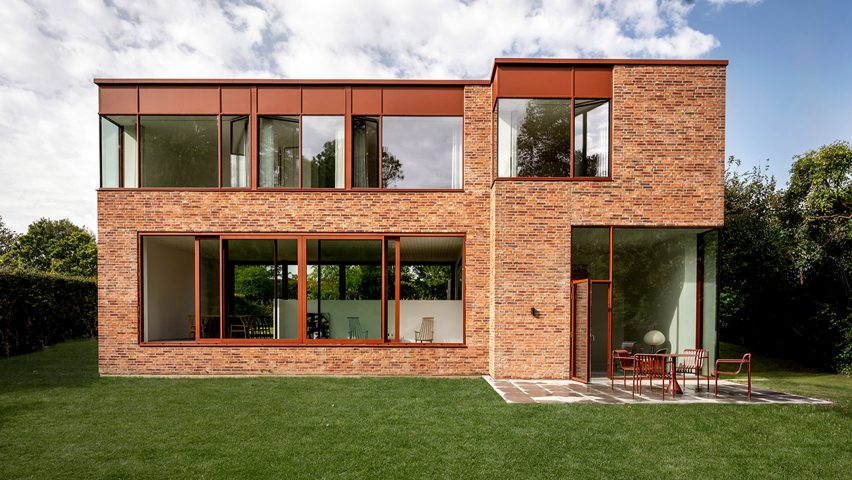Local studio Valbæk Brørup Architects drew on the principles of Danish functionalism for Kildeskovsvej, a red-brick house outside Copenhagen with a blocky form broken up by large corner windows.
Located on a gently sloping site in the city's northern suburbs and named after the street on which it sits, Kildeskovsvej has a deliberately simple form that references the typical two-storey brick homes in the area.
These neighbouring residences were constructed during the era of Danish functionalism, which Valbæk Brørup Architects said prioritised "simplicity and purposeful design".
"[These homes] were all constructed between 1900 and the 1950s, during the period when modern Danish houses were being developed," Valbæk Brørup Architects' partner Stefan Valbæk told Dezeen.
"They have inspired our approach to the project, where we wanted to create a hyper-modern residence, but with clear references to the old villas and the context in which the project is situated," he added.
Thanks to its T-shaped plan, Kildeskovsvej has two gardens on either side. The one facing north is more private, while the other facing the road to the south is more open.
A kitchen and dining room at the heart of the home benefit from dual-aspect views over both of these gardens, opening onto a patio to the north.
The slope of the site enabled the studio to sink the living room slightly, creating a feeling of spaciousness that is enhanced by a fully glazed corner incorporating a door to another patio.
This is contrasted by the narrower end of the home, where a corridor leads to a small seating area. Above, the bedrooms overlook the garden with a row of large windows.
"The house's open glass entrance towards the road welcomes the inhabitant – through a dark corridor, one moves further into the house from here," said Valbæk.
"The movement through the house is a spatially contrasting narrative, with different moods tailored to the functions of the rooms and the unique character of the plot," he added.
Kildeskovsvej's exterior is clad in red brickwork, complemented by copper-coloured metal window frames and parapets.
Inside, this minimalist approach is continued, with white walls, paved and wooden floors and ceilings clad in cement-bonded wood wool to dampen reverberations.
"The choice of material inside is simple and calm, allowing the highly tactile red bricks on the facade, the windows and the landscape to remain in focus," said Valbæk.
Copenhagen-based studio Valbæk Brørup Architects was established by Valbæk and Eva Kristine Brørup in 2005. Previous projects by the studio include a barrel-vaulted summer retreat in a Danish forest that is reminiscent of agricultural structures.
Other Danish houses recently featured on Dezeen include a cedar-clad summerhouse by Norm Architects and Villa E in Aarhus by CF Møller.
The photography is by Peter Kragballe.

